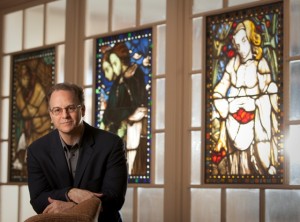
Eric Ziolkowski, Dana Professor of Religious Studies
Eric Ziolkowski, Dana Professor of Religious Studies, took an interest in Danish writer Søren Kierkegaard at an early age, first reading the 19th century philosopher and theologian’s Fear and Trembling at age 13. In graduate school, Ziolkowski studied his works in depth in a graduate seminar at University of Chicago with Kierkegaard authority Langdon Gilkey.
Since that time, Ziolkowski has written and published numerous articles on Kierkegaard, and also lectured on him at conferences in the U.S. and abroad. Yet his academic interests were divided among other subjects and Kierkegaard was never the central focus of his scholarship.
“At a certain point, however, I realized that I had enough to say about Kierkegaard, especially from my decidedly comparative, literary-historical perspective, to devote an entire volume to him,” Ziolkowski says.
That volume, The Literary Kierkegaard, will be published by Northwestern University Press in early 2011. It examines Kierkegaard first and foremost as a literary prose artist and considers his entire body of published writing, as well as his private journals, papers, and letters. He looks at the work in relation to pieces by five classic literary artists from different times and places: the comic drama Clouds by the ancient Greek playwright Aristophanes, the courtly epic poem Parzival by the Middle High German poet Wolfram von Eschenbach, the novel Don Quixote by the Renaissance Spanish author Miguel de Cervantes, a number of Shakespeare plays, particularly Hamlet; and the fictional, poetic-philosophical work Sartor Resartus by Kierkegaard’s own Scottish contemporary, Thomas Carlyle.
“Like Freud, Kierkegaard is someone whose ideas were so deeply influential that people who have never read him, let alone even heard of him, unwittingly draw upon them quite regularly,” Ziolkowski says. “In a number of my classes, often just in passing, I will call the attention of my students to some comment or observation Kierkegaard may have made that directly bears upon something one of them may have said.”
Ziolkowski says he is considering teaching an upper-level special topics course on a selection of several Western “literary” religious thinkers, including Kierkegaard, from different times and places.
Ziolkowski is also one of the six main editors for The Encyclopedia of the Bible and Its Reception (EBR), which will put out the third and fourth of its prospective 30 volumes in early 2011. This encyclopedia, published by De Gruyter Press in Berlin, incorporates articles by hundreds of authors from around the world.
The encyclopedia will be published in English, and the articles will appear in print and online. It is intended to be a user-friendly resource for biblical scholars as well as general readers. It is a comprehensive and in-depth examination of the current state of knowledge on the origins and development of the Bible. It also documents the history of the Bible’s reception in the Christian churches and the Jewish Diaspora; in literature, art, music, and film; in Islam; and in other religious traditions and current religious movements.
Thirty-four editors on different continents are involved in this massive international project: six main editors, who work with a total of 28 area editors.
The project was conceived and initiated by Hebrew Bible scholars Hermann Spieckermann of Germany’s Göttingen University and Choon-Leong Seow of Princeton Theological Seminary. At their invitation, Ziolkowski joined the editorial team in summer 2003 as one of the first editors.
“As I am a specialist in the interdisciplinary area of religion and literature, my work has always—of necessity—dealt in one way or another with questions and topics of biblical reception,” Ziolkowski says.
During the first few years of the project, much time was invested in conceptualizing, assembling the editorial board, establishing a complex online platform, planning, and getting the whole enterprise started. Now, the editors hope to settle into a rhythm of producing three volumes each year. Ziolkowski will continue to serve as an editor for future volumes of the EBR.
“On the editorial board, we joke sometimes about whether any of us will still be alive when the last of the 30 projected volumes appear in print,” he says. “But in all seriousness, we editors are committed to the project for the proverbial long haul.”
Ziolkowski is the author of two other books, The Sanctification of Don Quixote: From Hidalgo to Priest (1991) and Evil Children in Religion, Literature, and Art (2001). He has also edited A Museum of Faiths: Histories and Legacies of the 1893 World’s Parliament of Religions (2001) and Literature, Religion, and East/West Comparison: Essays in Honor of Anthony C. Yu (2005).

2 Comments
Comments are closed.